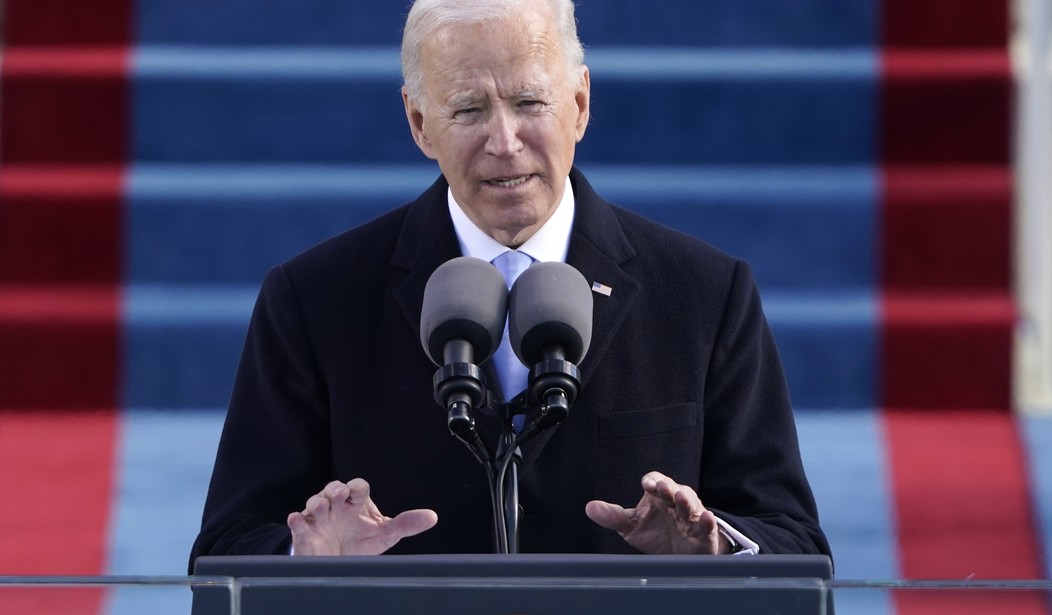The $1.9 trillion relief bill that President Joe Biden wants Congress to pass now as his response to the COVID-19 pandemic would cost Americans more than the entire federal government cost in fiscal 1981.
That year, according to the historical budget numbers that Biden's own Office of Management and Budget has published on the White House website, the federal government spent approximately $678,241,000,000.
When that is adjusted for inflation from September 1981 dollars into December 2020 dollars (using the Bureau of Labor Statistics inflation calculator), it equals $1.895 trillion.
Last March, President Donald Trump signed a $2.3 trillion spending law to deal with the COVID-19 pandemic.
In December, Trump signed another spending law that included $900 billion targeted toward COVID-19 relief.
Now Biden wants to spend another $1.9 trillion.
If, sometime in the next two months, Congress were to approve the total $1.9 trillion in COVID-19 spending that Biden is now requesting, total federal spending in response to COVID-19 approved over the past calendar year would hit $5.1 trillion.
That would be more money than the federal government spent on all of its activities in any fiscal year until last year.
In fiscal 2019, before the pandemic hit, the federal government spent approximately $4,512,677,890,000 in constant December 2020 dollars (according to the historical annual spending figures published on the Biden White House website -- $4,448,316,000,000 -- adjusted for inflation from September 2019 dollars to December 2020 dollars).
Recommended
In fiscal 2020, when the pandemic began in the United States, the federal government spent a record total of $6,551,872,000,000, according to the Monthly Treasury Statement for September 2020.
To put this spending in perspective, there were 158,735,000 people in the United States who had jobs in December 2019, the month before publicly reported COVID-19 cases started occurring in the United States. That means that if Congress were to accept Biden's $1.9 trillion proposal for an additional COVID-19 relief bill, bringing total COVID-19 relief spending to $5,100,000,000,000, federal spending on COVID-19 relief over just one year would equal $32,129 for every one of the 158,735,000 people who had a job in December 2019.
If Congress did not approve a penny of Biden's proposed $1.9 trillion in additional relief, the $3,200,000,000,000 the federal government spent in the March and December COVID-19 relief measures already equals approximately $20,159 for each of the 158,735,000 people who were working in the United States in December 2019.
Did you get $20,159 worth of COVID-19 relief and protection from the federal government? Do you think you will get $32,129 worth if Biden gets to spend his additional $1.9 trillion?
To be sure, some of the things Biden is suggesting in his COVID-19 relief plan make sense.
"The package includes more than $400 billion to combat the pandemic directly, including money to accelerate vaccine deployment and to safely reopen most schools within 100 days," The New York Times explained in a story outlining Biden's $1.9 trillion plan.
If $400 billion of Biden's plan will be spent "to combat the pandemic directly," where will the remaining $1.5 trillion go?
"Another $350 billion would help state and local governments bridge budget shortfalls, while the plan would also include $1,400 direct payments to individuals, more generous unemployment benefits, federally mandated paid leave for workers and large subsidies for child care costs," said the Times.
So, state and local governments that are already taxing the incomes, property and the retail purchases of hardworking Americans would get additional money from the federal government that Biden would need to borrow to give them.
For generations to come, working Americans would be taxed to pay the interest on this new debt Biden wants the federal government to incur.
Then there are those $1,400 "direct payments."
"Biden would expand the payments to cover all adult dependents, rather than just children, while keeping the existing phaseout thresholds at $75,000 for individuals and $150,000 for joint filers," reports the Congressional Quarterly.
So, a married couple with no children and a combined income of $149,000 would get $2,800 from the federal government.
Biden's $1.9 trillion plan alone -- leaving aside the combined $3.2 trillion in COVID-19 spending the federal government approved in calendar 2020 -- would cost $11,969 for each of the 158,735,000 people who had jobs in December 2019.
Of course, because the government is already running a deficit, all of this new spending would be done with borrowed money.
When Biden took office as President Barack Obama's vice president on Jan. 20, 2009, the federal debt stood at $10.6 trillion. Eight years later, when Donald Trump was sworn in as president on Jan. 20, 2017, it stood at $19.9 trillion. By Jan. 20, 2021, when Biden was sworn in as president, it had risen to $27.7 trillion.
In just the last two presidencies, the federal debt has risen by $17.1 trillion -- or about 161 percent.
The COVID-19 pandemic was caused by a lethal virus this nation has sacrificed much to control. Our runaway federal government is caused by politicians we do not control enough.
Terence P. Jeffrey is the editor in chief of CNSnews.com.
























Join the conversation as a VIP Member